- All That Is Mine Can Be Yours/How Can I Tell? (Picadilly 7N 35262) 1965
- That's When Happiness Began/Goodbye Little Girl (Pye 7N 17183) 1966
- Ciao Baby/Anyone There (Pye 7N 17282) 1967
- Take My Hand/Top Hat (Pye 7N 17338) 1967
- You've Got To Be Loved/Difference Of Opinion (Pye 7N 17394) 1967
- A Step In The Right Direction/Someday (Pye 7N 17499) 1968
- You're Making A Big Mistake/Run To Me (Pye 7N 17597) 1968
- Roundabout/Mystery (Pye 7N 17697) 1968
- I'm Gonna Change/Run To Me (Independence - USA only) 1968
- Ciao Baby/Someday (Pye re-release) 1969
- Lets Get A Little Sentimental/Hey Diddle Diddle (MCA MK 5036) 1970
- Suzanne/Your Love Is Growing (MAM R62) 1971
- No Smoke Without Fire/Seaport (MAM R45) 1971
- Uncle John's Band/Doctor Nero (MAM 14) 1971
- Love Machine/Oh But I Love You (Charisma CB265) 1973
The Montanas
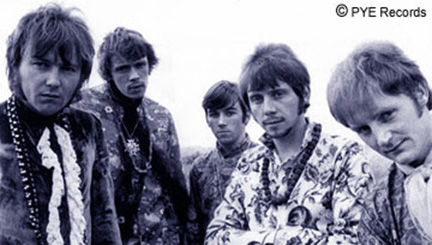
Written by BrumBeat contributor Brian Nicholls
WOLVERHAMPTON
Updated January 2018
Graham Crew drums (left in 1967)
Bill (William) Hayward lead guitar
John "Johnny" Jones vocal
Ralph Oakley bass guitar (left in 1965)
Terry Rowley bass guitar & keyboard (joined in 1965)
Jake Elcock bass guitar (joined in 1967)
Graham Hollis drums (joined in 1967)
Ian "Sludge" Lees vocal (joined in 1969)
George Davis keyboards (joined in 1970)
"You've Got To Be Loved"
A situation occurred recently that was personally quite heart warming. I was walking through Wolverhampton's indoor market when a fellow tapped me on the shoulder and said; "Excuse me, but are you Jake Elcock?". I said that I was, to which he replied; "Can I shake your hand? because you remind me of what were the best years of my life at Dudley Jazz Club"... "and I thought - this is fantastic - because I personally, had the privilege to be part of that era that brought back such fond memories for him. He was so pleased" said Jake Elcock, in an exclusive interview with author Brian W. Nicholls on 28 April 2010 about local 1960s pop group and recording artistes, THE MONTANAS.
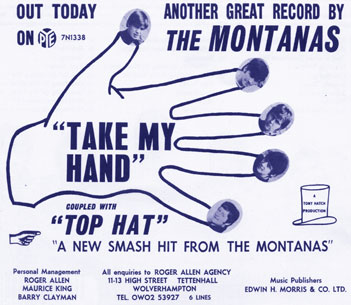
The fellow who approached Jake (Jake being a former bassist with The Montanas and prior to that, Dudley's Marauders, The Strangers and Finders Keepers) was referring to the mid 1960s - an iconic era known as, "The Beat Boom" and also, a burgeoning local music scene in and around the Black Country at that time. To coin a phrase, "The Beat Goes On"... Well, at least in our hearts and minds it does!!
As a local music historian, I had the good fortune in April, 2010 to spend a morning with Jake Elcock in order to produce this exclusive story of The Montanas or "The Monts" as they were referred to by their fans. A well-loved bunch of extremely talented lads from around the Black Country, more than worthy of the title, "accomplished musicians" they could quite comfortably hold their own with any national or international household names in the business.
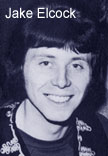
As Jake Elcock recounted his many memories and experiences of being an active part of the formation and development of a significant number of 1960's West Midland pop groups I realised that his 'journey' was typical of most of us at that time. Jake: "My earliest memories of musical involvement was helping my dad load his drum kit into his car for his Friday and Saturday evening residencies with The Art Baker Quartet at The Queen Mary Ballroom in Dudley. In the mid to late 1950s the piano was always a fixture in the parlour of virtually every house and I used to always muck around on it".
Jake found a ukulele one day whilst rummaging around in the loft of his parents home. "A local neighbour by the name of Greg Bannister knew quite a few chords as he played guitar in a number of local skiffle groups. Greg tuned the first four strings of the uke to the first four strings of his guitar and taught me all the chords he knew but, eventually, I switched to tea chest bass following an offer to join The Saints Skiffle Group at school."
Notably, The Saints came second in a skiffle group contest at Dudley Grammer School and Jake was well and truly on the ladder to greater things. "We were all just thirteen years old!" mused Jake. He used to carry the bass on the bus to local gigs as did most musicians in those days. "It was all acoustic as there were no amplifiers in use until later."
Following the demise of the skiffle rage in the latter part of the 1950s, Jake joined The Marauders - a group managed by an employee of Tipton Baths who was successful in finding them gigs. One such being a residency at Richardson's Hall in Wordsley every Friday evening. "I can't remember his name, all I know was he permanantly wore a trilby hat" says Jake.
"We used to play a lot of Elvis stuff and we were paid just ten shillings to split between us"
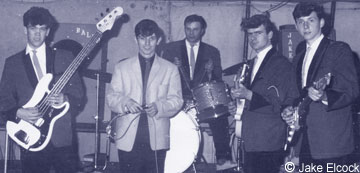
The Marauders also had a residency at the Jazz Club in Dudley every Monday evening and were paid purely on what they could make on door takings - a common practice at the time before the establishment of sophisticated agencies and promoters. "We used to play a lot of Elvis stuff and we were paid just ten shillings to split between us." It was at the jazz club that Jake met future Monts singer, Johnny Jones (he also met and became good friends with Stan Webb - a regular who went on to form Shades Five and then Chicken Shack).
The Marauders first used old radios and adapted them to amplifiers before progressing to Linear Amplifiers which required you made your own speaker cabinets. "An electrical shop in Dudley run by Arthur Parkes would make up decent speaker cabinets if you were less inclined to do it yourself. We used to put pick ups on our acoustic guitars until we could afford a proper electric guitar."
A fellow by the name of Rene Greenshill of Hardy House Lane in Coseley made beautiful prestige custom amplifiers at his home which were highly regarded by local musicians as a 'must have'. "Rene was a bit of an eccentric character who worked alone and, as demand increased he often had to literally work through the night to meet order deadlines - one noteable customer was no less than the ever popular Tommy Burton Combo who possibly jumped the three to six month waiting list. His amps were works of art and I remember going around every night to pester Rene for my order."
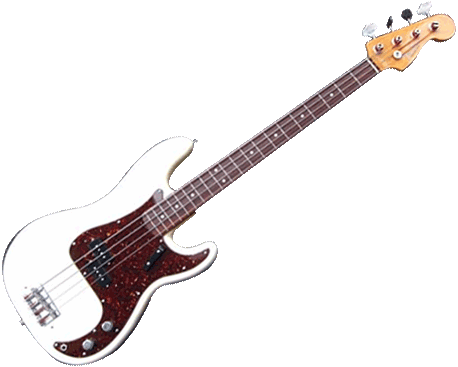
Although Jake played lead guitar, his heart was really with the bass; "The first ever electric bass I ever saw live was at Sedgley Parish Hall - I knew then that some day I had to have one. One group we saw was The Tipton Teen Beats. They sported three Fenders and three Fender amplifiers - all purchased by the dad of one of the members. When they unexpectedly split up, the very same dad sold off all the equipment and I became the lucky owner of a Fender Stratocaster at a very reasonable price. This was something of an achievement because, remember, we were all still at school"
Jake soon joined The Strangers and swapped his Strat for a cool Fender Precision Bass which stayed with him to become a defining sound of that group and later, both Finders Keepers and The Montanas! The Strangers contributed to the Decca compilation album, 'BrumBeat'. "Our inspiration was The Beatles, The Shadows, Lonnie Donegan, Buddy Holly, Elvis Presley, and Gene Vincent. We used to go to The Savoy Roller Rink in Dudley to see Vince Brevitt and The Beebops" (with Mac Bailey on guitar who later joined Tommy Burton Combo).
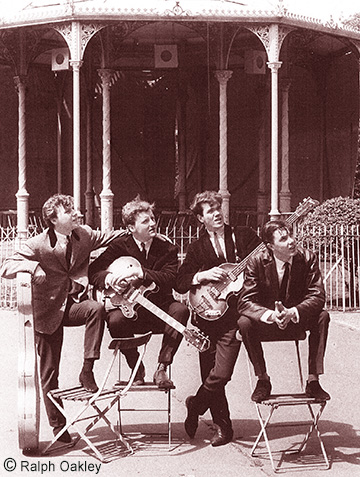
The first incarnation of The Montanas had comprised ex Dudley Grammar School pupil Ralph Oakley (bass/vocals), former member of The Strangers, Graham Crew (drums), ex Dudley Grammar School pupil Johnny Jones (lead vocalist), former member of The Crossfires and The Belmonts, Bill Hayward (lead guitar/vocals) and Alan Woolridge (rhythm guitar/vocals). Their first gig was at Whitmore Reans Working Men's Club. They were initially managed by Tim McGrath who was significant in shaping their formative period before they were headhunted by local impresario Roger Allen as they became increasing more popular.
I've mentioned Dudley Grammar School because Jake spoke of a large number of pupils playing a variety of instruments and forming groups and chopping and changing musicians almost on a weekly basis. Some of these were, Tony Dalloway (later of Wombourn folk group, Giggetty), Roy "Dripper" Kent (Strangers/Finders Keepers/Light), Mick Taylor (Herbies People) and, Eddie Cook (Strangers and Martells). Jake himself also attended Dudley Grammar and went on to perform with The Marauders, The Strangers, and Finders Keepers along with life-long friend and lead guitarist, Alan "Cleebo" Clee before joining The Montanas. Hopefully, this array of musicians may encourage a response from BrumBeat visitors who are also ex-pupils from that period.
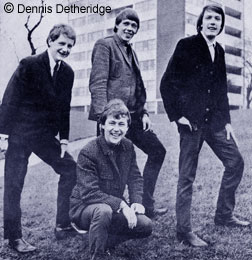
In the mid 1960s, there were six formidable agencies promoting pop groups and the prolific live music scene within the Wolverhampton area namely, the Roger Allen Agency, Astra Agency, Geoff Jacob's Agency, Nita Anderson Agency, PMA (a later merger between Roger Allen and George Maddocks and Tony Perry of Astra) and Quality Entertainments run by Reg Bradley who also found time to play trumpet in the Reg Bradley Band. In nearby Walsall there was also the (Miss) Terry Matthews Agency. Miss Matthews also ran a boutique called The Trend where local groups enjoyed a generous discount on stage clothing.
Now Roger Allen was not from a musical background, but he certainly made up for that with a natural business acumen and flamboyance in equal abundance! In fact, he soon earned the (justifiable) accolade as Wolverhampton's Brian Epstein. This came about as a result of the number of local groups he groomed (from the plethora of local musicians) from his office in Merridale Road, Wolverhampton.
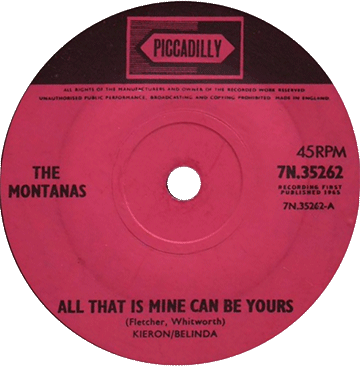
Montanas manager Roger Allen co-signed the group with Capable Management (a somewhat ironic name) in London to promote the recording aspect of their career. They were signed to Pye records for their first single, 'All That Is Mine Can Be Yours/How Can I Tell?' - a slow ballad which did not capture the essence of the group's public performing style.
The same problem was evident with their follow-up single 'That's Where Happiness Began/Goodbye Little Girl' although in contrast to the first single, was actually an upbeat number more in keeping with the Monts R&B leanings. Incidentally, this single has since become a collector's item amongst modern "Freak Beat" enthusiasts who are paying in excess of £100 per copy where the song is currently big on the Northern dance scene. After a slow start, the second single began to pick up pirate Radio Caroline airplay and so became a steady seller in the Autumn of 1966.
By now, The Montanas had built up a strong following throughout the UK appearing at the aforementioned Bailey's Nightspots and selling out shows in the Midlands and North East. A notable all-star show at the Civic and Wulfrun Halls on 15 July, 1966 saw Jones, Hayward, Crew and Rowley deliver a lively set of covers of, 'Ride Your Pony/You've Lost That Loving Feeling/L.O.V.E./Hava Nagila/River Deep Mountain High' - concluding with their second single, 'That's Where Happiness Began'. They also featured their "Batman" comedy sketch and Graham Crew also did a convincing impersonation of American singer, P.J. Proby. Notably, Proby had secured two UK hits during 1964 with 'Somewhere' and 'Hold Me'.
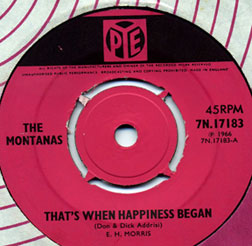
A major breakthrough was when, via Capable Management, The Montanas secured the spot of opening act for the Walker Brothers tour of forty four performances across the UK which also featured The Troggs, Dave Dee Dozy Beaky Mick and Tich, and Clodah Rodgers (who only managed the first show before dropping out of the tour). This tour finished at the Wolverhampton Gaumont in November, 1966 to two packed houses at which the local Express and Star reported the Monts as... "having a vocal and comedy act in a class along with The Barron Knights and The Rockin' Berries".
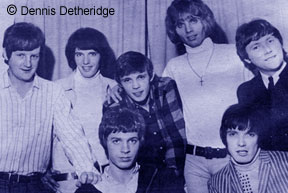
Graham Crew decided to call it a day just after the tour and was replaced by sixteen year old drummer Graham Hollis. Bass guitarist Ralph Oakley also left and was replaced by Terry Rowley from The Mountain Kings. This line-up continued for a short while until Roger headhunted bassist Jake Elcock from Finders Keepers and got Terry to switch to keyboards. Terry Rowley went on to play a major role in all of the group's future musical arrangements.
The Montanas now boasted a full diary of public engagements averaging twenty eight gigs per month comprising all the well known hot spots within the Black Country and surrounding area plus, TV and radio appearances such as 'Easy Beat' and 'Saturday Club'. Their public appearances also took them as far afield as France, Holland and Germany for live gigs and television.
"We were performing up to ten, forty-five minute sets a day - every day!"
The Montanas, like all their contemporaries, had served arduous apprenticeships by honing their musical and performance skills in pubs, clubs and ballrooms to the level evidenced in their professional live performances and recordings. However, It was the German gigs that really made a band 'tight' due to the extensive amount of on-stage appearances demanded compared with the UK... "We were performing up to ten, forty-five minute sets a day - every day!" mused Jake.
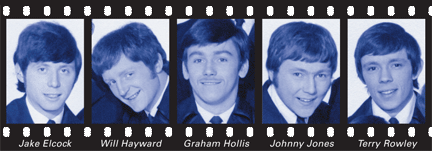
A new sound and a new image to match! The boys were all kitted out in bespoke blue suits and Anello and David designer brand boots - as worn by The Beatles - and available only in their Carnaby Street store. They were now ready (and well shod) to conquer the elite and lucrative cabaret circuit. Change too for Roger Allen. He joined forces with promoters George Maddocks and Tony Perry to create the formidable PMA Agency (Perry, Maddocks, Allen) based in Waterloo Road, Wolverhampton. Both George and Tony had played in local band The Strollers as drummer and saxophonist respectively so they had both worked on the shop floor, so to speak.
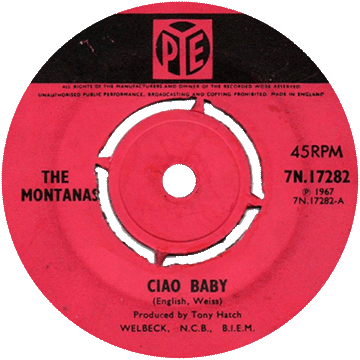
The lads also introduced comedy sketches within their set and were, as a result, very popular on the Bailey Circuit of sophisticated Northern Cabaret venues and night clubs playing alongside international artistes and jointly entertaining a discerning, but nevertheless appreciative clientele. Unlike most of the local groups of yore, The Montanas were equally comfortable in cabaret as they were in the ballroom dance environments. Within the cabaret scene they split their set fifty/fifty between music and comedy sketches.
The Monts remained with Pye and renowned producer/song writer Tony Hatch jumped at the chance to produce their records. Together with his wife and singer, Jackie Trent, the couple wrote some memorable songs for the group. The first single under the 'new' classic line-up was 'Ciao Baby' swiftly followed by 'Take My Hand' (the B-side 'Top Hat' written by The Bee Gees) and, although all three Pye records thus far sold well, national and international success eluded the group.
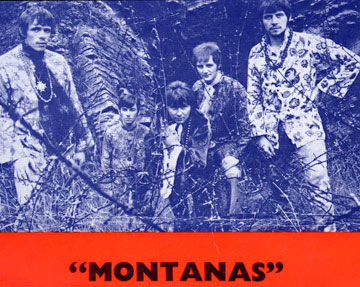
There were four significant incarnations of The Montanas, but many will argue that the second was the most significant and hence, the acknowledged classic period. This was due largely to the prolific recording aspect of their career and television and radio broadcasts plus, significantly, breaking into the American charts with 'You've Got To Be Loved/Difference Of Opinion'. It still gets regular airplay to this day. In fact, it got a good plug (along with Ciao Baby) on the Mark Williams Show on The Bridge Radio, Stourbridge on 11 November, 2009.
The Monts, alongside other local groups, also get regular airplay on Brian Matthew's currently popular 'Sounds of The Sixties' on BBC's Radio 2 Saturday morning show. "We still, to this day, get at least one plug a month on Brian's show" said Jake.
The group in 1967 comprised, Johnny Jones (lead vocalist), Jake Elcock (bass/vocals), Bill Hayward (guitar/vocals), Terry Rowley (keyboards/vocals) and Graham Hollis (drums) were all deservedly on a crest of a wave promoting their latest single, 'Ciao Baby/Anyone There?' This particular number, written by American songwriter, Scott English (who also wrote Mandy for Barry Manilow) had been voted... "a unanimous hit" on the popular prime-time BBC Juke Box Jury show hosted by David Jacobs with a jury comprising, Alan Freeman, Maggie Clews, Simon Dee and Julie Foster. It was also tipped a "big hit" on the BBC's Newly Pressed radio show.
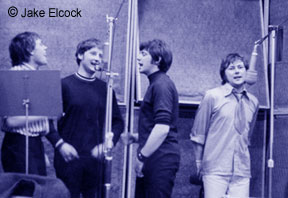
'Ciao Baby' was just one of many releases by The Montanas but, arguably, this was possibly their most remembered as it seemed to set the benchmark for their catalogue of well-crafted pop songs. Talk about the Monts to this day and people will say,.."Aaah The Monts. Didn't they do Ciao Baby?"... The fact that the record was re-released in 1969 perhaps supports my assertion. Understandably, the song was very popular in Italy and, interestingly, the title caught on locally with people saying "ciao" instead of "goodbye" to each other.
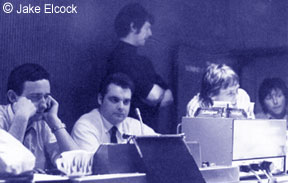
Produced by British songwriter, Tony Hatch, 'Ciao Baby' received many power plays on Radio Luxembourg. Released in March 1967 with 'Anyone There?' as its flip side, it sold over 10,000 copies in Britain alone and was even covered by American female group, The Toys. Everyone will have a Tony Hatch produced or composed song somewhere in their record collection. He wrote for, and produced both, Petula Clark and The Searchers - just to name but two! Interestingly, he wrote and recorded the theme tune to the popular early evening soap, Crossroads. The Searchers' chart popularity had seriously waned at this point and Hatch saw the Monts filling their shoes as a sort of "New Searchers" as far as the Pye record label was concerned.
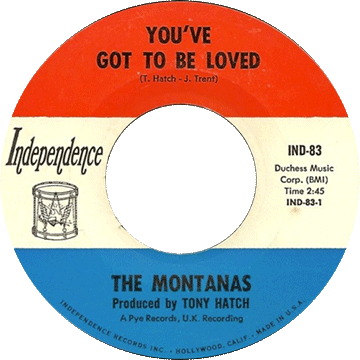
Tony Hatch was determined to break out the band with the beautifully crafted single 'You've Got To Be Loved' released on Friday 13 October, 1967 which, as already stated in this article, sold well in the UK, but failed to chart here - despite three spins a day, every day on the Tony Blackburn BBC Radio One Show. However, this was not the case in America because, unbeknown to the group, they were building up a healthy USA following (which exists to this day) with 'That's Where Happiness Began' and 'Ciao Baby' - notably on America's West Coast. Then followed 'Take My Hand'.
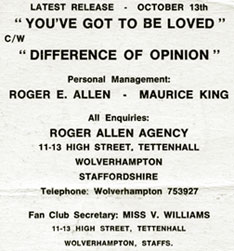
The next USA single was 'You've Got to Be Loved' which proved again to be hugely popular on the West Coast making several local top ten chart entries. Eventually, the record cracked the Top 100 and peaking at number 33 in Record World, 41 in Cashbox and 58 in Billboard within two months of release. A follow-up single 'I'm Gonna Change/Step In The Right Direction' failed to achieve the same reaction. However, a third US single, 'Run To Me' again came close to "Loved" in its appeal to the Americans by reaching a healthy number 8 in Chicago.
"Johnny was a musical fanatic - he was up on all the latest fashion trends and music press"
Jake said; "It was Johnny Jones who found out about the American charts. He was an avid reader of New Musical Express and Melody Maker whereupon he made the discovery. Johnny was a musical fanatic - he made it his whole life, he was up on all the latest fashion trends and musical press." Capable Management had failed to keep them or PMA informed of the emerging American interest and a golden opportunity for the group to 'discover America' was lost! Capable Management indeed!
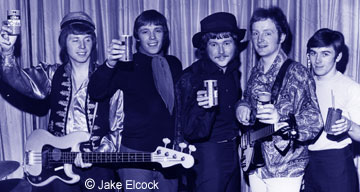
This was the crucial crossroads in the Monts career. Had they been promoted effectively in the States with a follow-up tour reinforced with national television and radio they would, at the very least have definitely broken into the American national top ten! But, given the quality of the songs and record productions coupled with the group's musical prowess then it doesn't take a genius to work out that Capable Management in London had failed to deliver their side of the bargain.
You've Got To Be Loved was subsequently covered by The Four Freshmen in America and Long John Baldry in the UK - just to name two that readers will recognise. Tony Hatch and The Monts carried on their business partnership releasing another three singles; 'Step In The Right Direction' (1968), 'Run To Me' (1968) and 'Mystery' (1969) but it was felt they had missed the boat commercially. Pye, like all commercial concerns, said they needed a return on their investment and despite Hatch's protestations to the company, The Montana's recording contract was terminated in the same way as The Searchers some time previously.
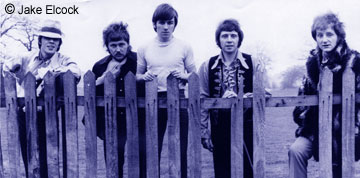
Notwithstanding this apparent setback, the group were at the height of their popularity in the UK generally and in the Black Country and Midlands areas in particular. Their unique blend of R&B, pop, and classic covers together with their close harmony versions of Beach Boys and Four Seasons hits ensured sell-out crowds, particularly in the Midlands area where fans would literally queue before the venue opened to ensure a seat. This was particularly so at The Cleveland Arms in Willenhall which was also a mecca for local musicians every Sunday lunchtime.
Jake; "The Cleve, as it was known, was our second home. We had a Sunday lunchtime residency and people queued around the corner to get a seat - it was always packed out. We would try out new numbers that we had rehearsed during the previous week at Terry's house in Penn, Wolverhampton. We would also test out our comedy routines and we would ALWAYS go down a bomb!"
The Monts were also constantly in demand for live radio broadcasts on Radio One Club with the shows hosted by Jimmy Young, Dave Lee Travis and Simon Bates. On 16 July, 1967 they appeared on 'Easybeat' performing 'River Deep Mountain High', 'Morning Dew' and 'Take My Hand' and were told it was one of the finest live performances in the history of the show. In 2006, Top Sounds of Coventry discovered some recordings of these shows from the BBC archives and have released some of the sessions on a compilation album entitled 'Shapes and Sounds'.
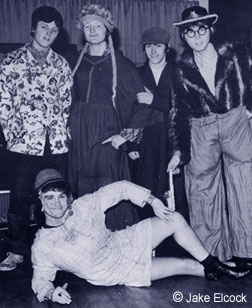
By now, The Monts had parted company with Roger Allen and Capable Management and were signed with the Astra Agency of Wolverhampton. Astra booked most of the local venues and indeed actually owned several nightclubs including The Lafayette, the Catacoombs, The Kingfisher Country Club and the Village (Newport). They also handled some twenty six local professional groups (all working an average of twenty eight gigs per month, every month!!) as well as being the local coordinator for national and international stars.
Shortly after the signing to Astra, a major split occurred within the ranks of The Montanas. 'Super groups' were popping up all over the UK in the wake of Cream and The Jimi Hendrix Experience so it was decided to create one such group from Wolverhampton. Johnny Jones and Terry Rowley from the Monts were linked up with Glenn Hughes, Mel Galley and Dave Holland from Finders Keepers.
The new band (the brainchild of Jones and Rowley) was aimed at the growing "heavy-rock" scene and were to be called Trapeze - managed by Tony Perry and George Maddocks who had since joined Astra. Sadly, this genre of music with its excessive amplification proved to be the death knell for local live music in predominantly small pub and club venues.
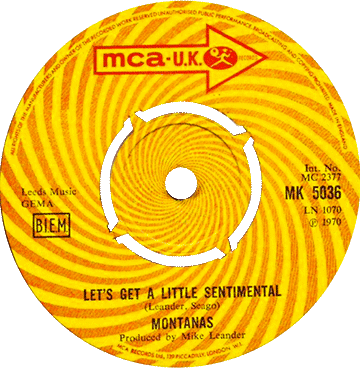
The remaining Montanas decided to carry on in their third incarnation and brought in Ian "Sludge" Lees from Finders Keepers (and formerly from popular Cannock group The Telstars). Lees had always an inclination for "treading the boards" having made quite an impression on the popular television programme Carrol Levis' Junior Discoveries at the ripe young age of just nine! Later in his career he appeared on the prime-time Yorkshire Television programme "The Comedians".
George Davis, an extremely talented keyboard player was also recruited to maintain The Monts full stage sound. They subsequently, on past reputation, secured a recording contract with MCA and released 'Let's Get A Little Sentimental' which, despite extensive airplay just failed to make the charts. However, this single DID make the Top 10 on some American radio station charts in 1970.
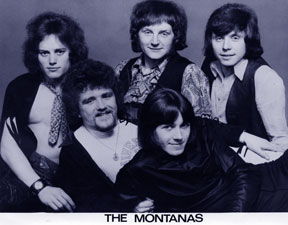
Meanwhile, Trapeze was launched in a blaze of publicity with a TV appearance on "Colour Me Pop" and a debut album to follow. However, within twelve months, personal and musical differences had set in resulting in the departure of Johnny Jones and Terry Rowley. With Jones and Rowley available again the Montanas had a difficult decision to make; to carry on as they were (they were now writing their own material) or; to bring back their two original members. A vote was taken and on a split decision, Jones and Rowley were back on board so it was now back to the "classic" line up of The Monts (or second incarnation). George Davis worked briefly with a couple of local bands but went into writing and record production. Sludge Lees joined the popular local group Light Fantastic.
"We used to drip with sweat hauling it around but it was worth it in the end"
The sound of the Montanas was reinforced by the purchase of a Mellotron, from The Moody Blues. This was a keyboard-operated analogue 'sampler' that was able to accurately replicate strings and horns on stage giving the Monts a full orchestral sound. The Mellotron, although 'state of the art' at the time, was crammed full of mechanically driven pre-recorded tapes thus making it heavy and requiring four people to move it around. Jake said; "We used to drip with sweat hauling it around but it was worth it in the end." The nightmare was when they did double bookings in one evening, often encountering several flights of stairs usually via an external fire escape!
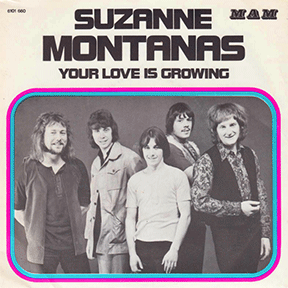
Astra's George Maddocks took over the manager's chair for The Montanas and used the relative 'strength' of their chart near-misses to secure a recording contract with MAM which resulted in three more quality releases - 'Suzanne', 'Uncle John's Band' and finally 'No Smoke Without Fire'. All these got the usual rave reviews and plenty of airplay but sadly, no chart successes.
Graham Hollis left the group and went on to open a music shop in Wolverhampton. He was replaced by Rob "Artie" Elcock, a great solid drummer (and distant relative of Jake's) with an excellent voice who had played with several local bands including Ashley and Dual Purpose. The new line-up went straight to the famous Star Club in Hamburg for three weeks where they were a huge hit with the visiting American servicemen and regular clubbers. This was the Monts third German visit and interestingly, their records are much sought after over there to this day.
Guitarist Bill Hayward was next to leave in September 1972. He had secured a position outside of the music business as a salesman at which he proved to be very successful indeed. Bill was replaced by Rob Kendrick from Ashley - a local group managed by Maurice Jones. Rob left to join Trapeze and toured America with them.
Rob Elcock left to become a record company representative. Terry Rowley also left shortly afterwards to pursue his recording ambitions and it came as no surprise with this haemorrhage of founder members that the band decided to call it a day after Jake Elcock also left to work for Astra where his name alone opened up new horizons for aspiring musicians.
Johnny Jones however, decided to carry on and picked up a Cannock group named "Mail" and renamed them "The Montanas". This incarnation (number four) released one single 'Love Machine' in 1973 and continued to perform until 1978 whereupon Jones himself left to live in Wales and formed a duo called "Locke and Jones" performing on the Welsh club circuit before deciding to call time on the music business to concentrate solely on stand-up comedy and solo vocals.
So, you may well ask... "Where are they all now?"
Jake was boss of Elcock Entertainments for twenty eight years when in 2007 he sold the business but is still retained on a consultancy basis. The company is a successful agency specialising in tribute bands and stand-up comedians. Terry Rowley owns The Drunken Duck Pub in Playa de las Americas in Tenerife where he still performs seven nights a week. Ralph Oakley has gone on to become a successful author. Bill Hayward is a successful double glazing salesman. Ian "Sludge" Lees is currently a regular name on the local stand up comedy circuit and is managed by Elcock Entertainments. Graham Hollis stills performs but is mainly a drum tutor in Birmingham.

Rob Kendrick was, the last time we heard, reputedly a session guitarist and record producer in California. Rob Elcock sadly passed away in 1999. All contact with Graham Crew is lost (but if you are reading this Graham, please get in touch with the author via the BrumBeat web site). Maurice Jones - who ran Midland Concert Promotions - sadly passed away in November, 2009 aged 64. George Maddocks and his wife have retired to Javea in Spain. Reg Bradley has retired to Southern Spain. Tony Perry was until recently, still a local promoter. He now hosts the monthly Lafayette reunion meetings at The Connaught Hotel, Tettenhall Road and, Roger Allen sells timeshares in Tenerife!
At this stage it is prudent to recall the excellent job performed by the band's Roadies over the years. They were; John Kirby, Micky Winfer, Shaun Gilbert, Keith Mantle and "Loz".
"Will The Montanas ever get back together?" I asked Jake. Well, the good news is that Jake confirmed the aforementioned "classic" line-up are seriously talking about a three-night package concert whereby the Monts, (topping the bill, of course!) along with other local groups of yore together with stand-up comedians Sludge Lees, Ollie Spencer (ex Idle Race) and Mick Walker (ex Redcaps) will all come together early next year for a one-off "grandiose bash" at the Wolverhampton Civic Hall.
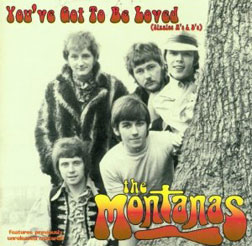
Jake; "It has only REALLY dawned on me in the past two years or so the significance of what we did. It was YouTube (on the internet) with our records being played and people's comments when they discover them." In 1997, Roger Dopson of Diamond Records gained access to all the old Pye/Picadilly record company archives and was amazed to discover; "This band (The Montanas) that had recorded over thirty tracks between 1965 and 1968 and had released eight singles in the UK and USA". With the group's co-operation, he compiled a twenty-six track CD which was a fresh album release, not a reissue, and appropriately entitled YOU'VE GOT TO BE LOVED. Just type this title into the Google search engine and you can still buy the CD. You can even get a ring tone of "Loved" for your mobile phone!
And finally, I asked Jake; "In your expert opinion as a seasoned promoter, will we ever see a repeat of those amazing times?" Jake concluded; "Definitely not! With all the home entertainments available - home cinema, satellite television and large concert hall venues etc, coupled with the demise of local pubs at a rate of fifty a week across the UK, there is no way back to the return of local musical entertainment to the proliferation that we experienced. Staying in, is the new going out!"
Author Brian Nicholls is a local rock music historian and was guitarist in 1960s West Midlands groups including Varsity Rag. Anyone wishing to contact Brian about The Montanas can do so by texting him at 07733 130162 and he'll get back to you.
Copyright © Brian Nicholls with grateful thanks to Jake Elcock, May 2010. Article Copyright © Brian W. Nicholls. Pictures (1960s): Copyright © Jake Elcock. Pictures (2010): Midland Beat Images: Copyright © Dennis Detheridge.
The Montanas 1960s Record Releases
Singles:
Montanas recordings can also be purchased via Top Sounds Records Ltd. www.topsoundsrecords.co.uk, a new record label dedicated to the release of rare records by 1960s bands.